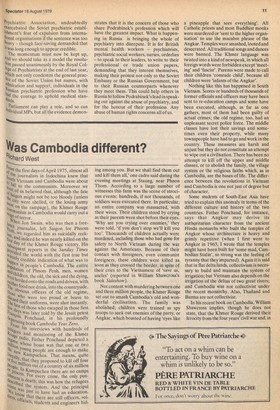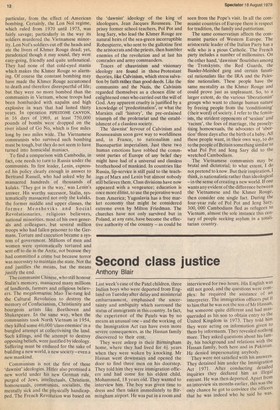Was Cambodia different?
Ilehard West ti:ri,c)nithe first days of April 1975, almost all die journalists in Indochina knew that Vietnam and Cambodia were about rt; fall to the communists. Moreover we ot of us believed that, although the fate Iligon might not be too .bloody (unless City were shelled, or the losing army flt on the rampage), the Khmer Rouge t:nanunists in Cambodia would carry out a ta of terror. ta: hen Jon Swain, who was then a free Journalist, left Saigon for Phnom 'We regarded him as suicidally reek and indeed he was nearly killed on the daY of the Khmer Rouge victory.. His p;"sequent reports in the Sunday Tunes s:vided the world with the first true but CreelY credible indication of what was to po-"Pen in people's Cambodia. The entire anP,141,4tion of Phnom Penh, men, women 1ildren, the old, the sick and the dying, ne-it,ekilerded onto the roads and driven, with Tcier food nor drink, into the countryside. th (je obvious officers of the old regime, disese ,who were too proud or brave to Th-,-,ru their uniforms, were shot instantly. ;ate of those who escaped in those first Fra'huaYs was later told by the Jesuit priest tiet,"C(ns Ponchaud, in his profoundly gessing book Cambodia Year Zero. ref,:tnn his interviews with hundreds of 110'„gees and monitoring of the Khmer registe radio, Father Ponchaud depicted a l'Ailinitoe whose boast was that one or two the n Young people are enough to make lit,.a-11,ew Kampuchea. That means, quite oriniveIlY, that they proposed to kill off four Pe °PI Out o fa country of six million * Kampuchea there are no camps ishvn n sons. For every crime, the only pundestric,euasnt is death; this was how the refugees crirt,-,:ed the system. And the principal 'Vt. Was just to have had an education. dier,"now that there are still officers, so. 1 officials, students and engineers hid ing among you. I3ut we shall find them out and kill them all,' one cadre said during the evening meetings at Staung, near Phnon Thom. According to a large number of witnesses this farm was the scene of atrocious events; hundreds, if not thousands, of soldiers were executed there. In particular, an entire company was massacred, with their wives. Their children stood by crying as their parents were shot before their eyes. `Why are you crying over enemies,' they were told, `if you don't stop we'll kill you too'. Thousands of children actually were murdered, including those who had gone for safety to North Vietnam during the war against the Americans. Because of their contact with foreigners, even communist foreigners, these children were killed as soon as they crossed the border, in spite of their cries to the Vietnamese of 'save us, uncles' (reported in William Shaweross's book Sideshow).
Not content with murdering between one and three million people, the Khmer Rouge set out to smash Cambodia's old and wonderful civilisation. The family was abolished; children were trained as spy troops to seek out enemies of the party, or Angkar, which boasted of having `eyes like particular, from the effect of American bombing. Certainly, the Lon Nol regime, which ruled from 1970 until 1975, was fairly savage; particularly in the way its soldiers murdered the Vietnamese minority. Lon Nol's soldiers cut off the heads and ate the livers of Khmer Rouge dead; yet, paradoxical though it may sound, they were easy-going, friendly and quite unfanatical. They had none of that cold-eyed mania which makes the Khmer Rouge so alarming. Of course the constant bombing may have made the Khmer Rouge accustomed to death and therefore disrespectful of life; but they were no more bombed than the communists in Vietnam, whose troops had been bombarded with napalm and high explosive in wars that had lasted thirty years. In operation PIPESTONE CANYON, in 16 days of 1969, at least 750,000 pounds of bombs were dropped on the river island of Go No, which is five miles long by two miles wide. The Vietnamese communists who survived such bombing must be tough, but they do not seem to have turned into homicidal maniacs.
To find a comparison with Cambodia, in fact, one needs to turn to Russia under the communists. Its first leader, Lenin, expressed his policy clearly enough in answer to Bertrand Russell, who had asked why he massacred hundreds of thousands of kulaks. 'They got in the way,' was Lenin's answer. His worthy successor, Stalin, systematically massacred not only the kulaks, the former middle and upper classes, the former Mensheviks and Social Revolutionaries, religious believers, national minorities, most of his own generals and colleagues, but several million troops who had fallen prisoner to the Germans. Torture and execution became a system of government. Millions of men and women were systematically tortured and sent off to die in the Arctic, not because they had committed a crime but because terror was necessary to maintain the state. Not the end justifies the means, but the means justify the end.
The communist Chinese, who still honour Stalin's memory, massacred many millions of landlords, farmers and religious believers. The megalomaniac Mao Tse-tung led the Cultural Revolution to destroy the memory of Confucianism, Christianity and bourgeois artists like Beethoven and Shakespeare. In the same way, when the communists took North Vietnam in 1954, they killed some 40,000 'class enemies' in a bungled attempt at collectivising the land. Such killings, and the attempt to destroy opposing beliefs, were justified by ideology. Suffering must be endured for the sake of building a new world, a new society —even a new mankind.
Communism is not the first of these `dawnise ideologies. Hitler also promised a new world under his new German rule, purged of Jews, intellectuals, Christians, homosexuals, communists, socialists, the mentally sick and the physically handicapped. The French Revolution was based on the 'clawnist' ideology of the king of ideologues, Jean Jacques Rousseau. The prissy former school teachers, Pol Pot and leng Sary, who lead the Khmer Rouge are natural heirs of the sea-green incorruptible Robespierre, who sent to the gullotine first the aristocrats and the priests, then humbler enemies of the revolution and at last his comrades and army commanders.
Traces of chauvinism and visionary ideology are found in those Protestant theories, like Calvinism, which stress salvation by faith rather than good deeds. Like the communists and the Nazis, the Calvinists regarded themselves as a chosen elite of enlightened ones who carried out the will of God. Any apparent cruelty is justified by a knowledge of 'predestination', or what the Marxists call 'history', the pre-ordained triumph of the proletariat and the establishment of a classless society.
The `clawnise fervour of Calvinism and Rousseauism soon gave way to worldliness and, in France, to nationalism and Buonapartist imperialism. Just these two human emotions have robbed the communist parties of Europe of any belief they might have had of a universal and classless brotherhood of mankind. In countries like Russia, lip-service is still paid to the teachings of Marx and Lenin but almost nobody still believes them. Class divisions have now appeared with a vengeance; education is once more elitist, to use the pejorative word from America; Yugoslavia has a free market economy that might be considered extreme even by Milton Friedman. The churches have not only survived but in Poland, at any rate, have become the effective authority of the country — as could be seen from the Pope's visit. In all the communist countries of Europe there is respect for tradition, the family and patriotism.
The same conservatism affects the communist parties of Western Europe. The aristocratic leader of the Italian Party has a wife who is a pious Catholic. The French party includes a number of millionaires. On the other hand, `dawnism' flourishes among the Trotskyists, the Red Guards, the Baader-Meinhof gang and certain fanatical nationalists like the IRA and the Palestine nationalists. These people have the same mentality as the Khmer Rouge and could prove just as unpleasant. So, to a larger extent, do the various `liberationist' groups who want to change human nature by freeing people from the `conditioning' (their word) of society. I refer to the feminists, the strident opponents of 'sexism' and 'racism', the foes of marriage, the proselytising homosexuals, the advocates of 'abortion' three days after the birth of a baby. All these people want, in their own way, to do to the people of Britain something similar to what Pol Pot and leng Sary did to the wretched Cambodians.
The Vietnamese communists may be brutal and dictatorial; to what extent, I do not pretend to know. But their inspiration, I think, is nationalistic rather than ideological —in the sense of creating a new world. If one wants any evident of the difference between the Vietnamese and the Khmer Rouge, then consider one single fact. During the four-year rule of Pol Pot and leng Sary, 300, 000 Cambodians fled as refugees to Vietnam, almost the sole instance this century of people seeking asylum in a totalitarian country.































 Previous page
Previous page